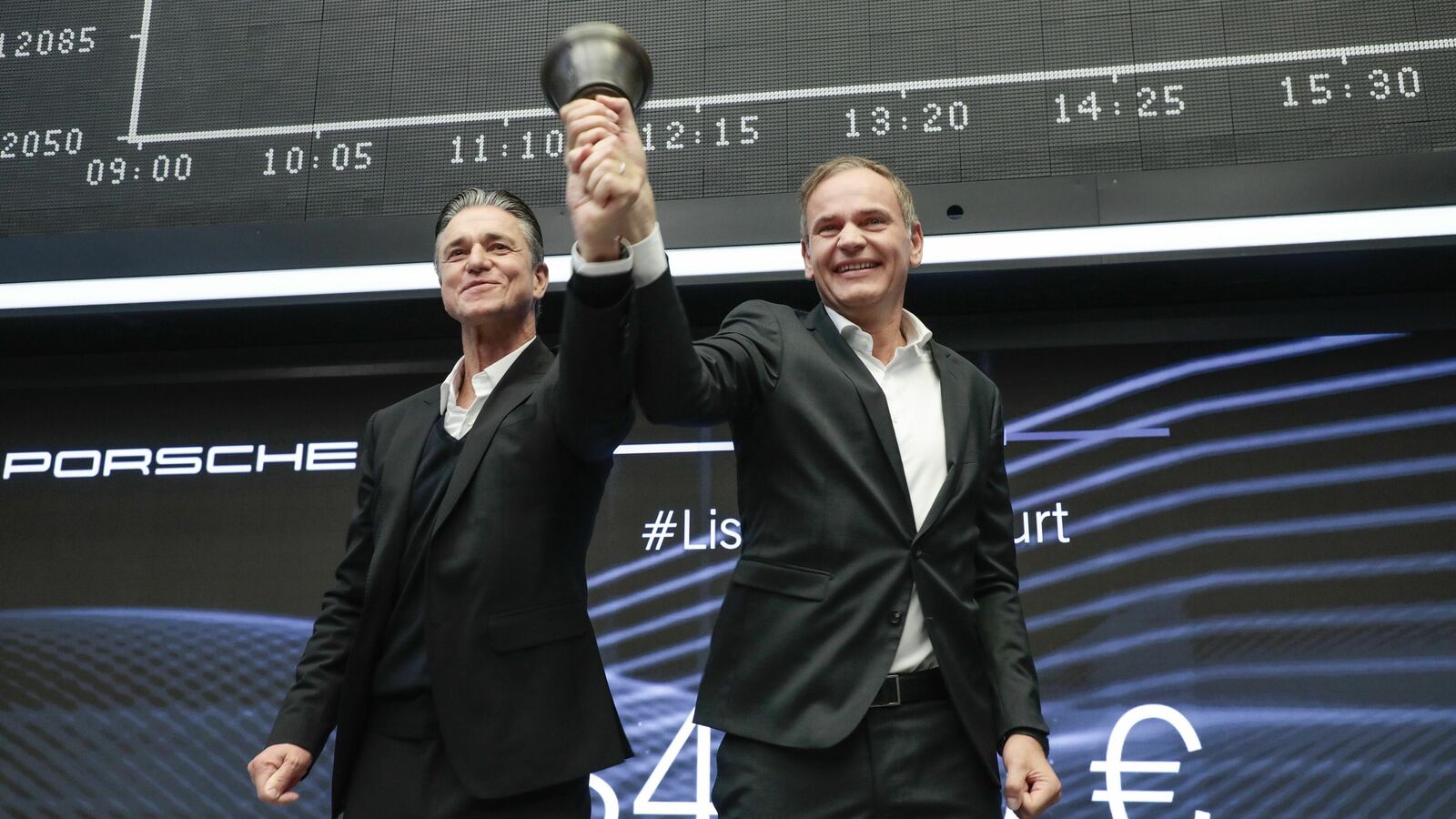After going public, Porsche established individual partnerships in the field of software, for example with Apple and Mobileye. “Forward-looking steps of this nature are an important part of being able to continue to exceed the expectations of our customers with desirable products and unparalleled Porsche experiences in the future as well,” says Lutz Meschke, Deputy Chairman of the Executive Board and Board Member for Finance and IT. “Autonomy helps us to accelerate even faster and thereby inspire our customers even more. This benefits not only our shareholders, but also our employees. Business success is, after all, the basis for secure and highly attractive jobs in Germany over the long term.”
On 29 September 2022, Porsche’s Chairman of the Executive Board Oliver Blume and his deputy Lutz Meschke rang the stock exchange bell on the trading floor of the Frankfurt Stock Exchange. It was Europe’s biggest IPO by market capitalization. Just three months later, in December of that year, Porsche AG gained fast entry to the leading German stock index (DAX). “The fast entry was a testament to the great confidence of the capital market in our brand, our product strategy and our business model,” says Lutz Meschke.
Porsche has repaid that trust in recent months: in the first six months of 2023, the sports car manufacturer posted significant gains in Group sales revenue, Group operating profit and deliveries. “The demand for our sports cars is strong worldwide,” says Blume. As we continue to implement our strategy of modern, sporty luxury, we are consistently investing in our product portfolio, innovations and our digital ecosystem. We want to make our products even better, even more unique, and even more appealing than they are today. We are focusing on limited editions and expanding our Sonderwunsch programme, among other priorities. We believe that we are very well positioned for the future – including on the important topic of sustainability.”
Porsche shares popular with private investors
Porsche’s ambitious goal is for more than 80 per cent of all new cars delivered to customers in 2030 to be all-electric. Porsche's first all-electric sports car Taycan contributes to this. In addition, the model lines will be gradually converted to battery electric powertrains from 2024 onwards. The all-electric Macan is scheduled to be delivered to customers in 2024. The all-electric 718 is planned for the middle of the decade. The all-electric Cayenne is expected to roll out to dealers shortly thereafter. Porsche is also planning to expand its product portfolio upwards with an all-electric SUV positioned above the Cayenne.
The shareholder structure of Porsche AG remains globally broad-based and stable. Lutz Meschke: “We’re particularly pleased with the great interest from private shareholders. Many of them do not own a Porsche, but can now be a member of the Porsche family as a shareholder. By going public, we’ve made Porsche more tangible.”
Financial markets around the world have come under pressure in recent weeks. One reason for this is the increasing uncertainty regarding global economic growth following the numerous interest rate increases by central banks. At the same time, the economic developments in China are being followed with a degree of concern. This also influenced the price of the PAG911 share.
Despite the still very challenging macroeconomic situation, Porsche has confirmed its forecast for the current financial year and subsequent financial years: if the global economic and supply situation does not worsen significantly, Porsche expects a Group operating return on sales in the range of 17 to 19 per cent at the end of fiscal year 2023. This forecast is based on the assumption of sales revenue in the range from 40 to 42 billion euros. In the long term, the sports car manufacturer is aiming for a Group operating return on sales of more than 20 per cent.
Disclaimer: This press release contains forward-looking statements and information that reflect Dr. Ing. h.c. F. Porsche AG's current views about future events. These statements are subject to many risks, uncertainties, and assumptions. They are based on assumptions relating to the development of the economic, political, and legal environment in individual countries, economic regions, and markets, and in particular for the automotive industry, which we have made on the basis of the information available to us and which we consider to be realistic at the time of publication. If any of these risks and uncertainties materializes or if the assumptions underlying any of the forward-looking statements prove to be incorrect, the actual results may be materially different from those Porsche AG expresses or implies by such statements. Forward-looking statements in this press release are based solely on the circumstances at the date of publication. We do not update forward-looking statements retrospectively. Such statements are valid on the date of publication and can be superseded. This information does not constitute an offer to exchange or sell or an offer to exchange or buy any securities.
Further information as well as film and photo material in the Porsche Newsroom: newsroom.porsche.de






